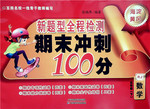题目内容
The police are _____ to conclude that the cause of fire was a cigarette end.
A. probable B. possible
C. maybe D. likely
练习册系列答案
 新题型全程检测期末冲刺100分系列答案
新题型全程检测期末冲刺100分系列答案
相关题目
题目内容
The police are _____ to conclude that the cause of fire was a cigarette end.
A. probable B. possible
C. maybe D. likely
 新题型全程检测期末冲刺100分系列答案
新题型全程检测期末冲刺100分系列答案